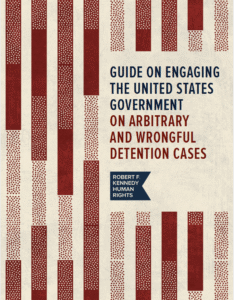
THE FIRST OF ITS KIND ANALYSIS PULLS TOGETHER DATA ON MORE THAN 700 CASES OF ENFORCED DISAPPEARANCE, OFFERING RARE INSIGHTS INTO THE MADURO REGIME’S PATTERNS, PRIORITIES, AND PERCEIVED THREATS.
Washington, D.C. / Caracas (June 19, 2020)—Robert F. Kennedy Human Rights and Foro Penal have published a new groundbreaking report showcasing how Venezuela’s Bolivarian regime uses enforced disappearances as a tactic to silence its political opponents.
The first of its kind analysis, available in English and Spanish, examines more than 700 cases of enforced disappearance—documenting how this cruel human rights violation has not only proliferated across Venezuela, but has specifically been used against women and members of the military as a targeted means of punishment and intimidation.
Ariana Granadillo, one of the survivors profiled in the report, has been disappeared and tortured on three separate occasions in an apparent attempt to threaten her family member, a colonel whom the government considers a political opponent. In an interview with the New York Times, she details how the traumatizing experience has impacted her life, saying she’s “discovered an evil in human beings that I did not know existed.”
Among our key findings:
- Enforced disappearance has been on the rise in Venezuela, skyrocketing from 200 cases in 2018 to 524 in 2019, nearly tripling in frequency (page 22).
- Women who were detained faced a greater chance of being forcibly disappeared than men. A significant number of these cases suggest that women were targeted either to extract information from them or to punish and intimidate their family members and loved ones (page 26).
- When military personnel are forcibly disappeared, they frequently report being tortured in the process. In 2018, torture was reported in 83.6% of the cases of military officials forcibly disappeared. By 2019, members of the military faced a nearly 95% chance of being tortured once forcibly disappeared (page 24).
While the report focuses on data from 2018 and 2019, politically-motivated detentions and enforced disappearances continue to take place today. As of June 2020, more than 230 cases of arbitrary detention have already been reported, of which 33 cases have resulted in enforced disappearance. Fourteen of these victims remain disappeared.
“Venezuelan security forces disappear victims, and in turn, tear apart families, terrorize communities, and degrade all humanity,” said Kerry Kennedy, president of Robert F. Kennedy Human Rights. “Our report details the unmistakable pattern of state-sponsored terror by the Bolivarian regime, the high cost of impunity, and the urgent need to stop these massive crimes now.”
“Enforced disappearance, and even more so when it is systematic, results in an intense violation of the detainee’s right to defense,” said Alfredo Romero, president of Foro Penal. “Enforced disappearance turns arbitrary detention—which in and of itself is a serious violation of human rights—into an opportunity for unlimited barbarity for the perpetrator. If not fully stopped and systemically prevented, enforced disappearance gives the perpetrator the freedom of damaging at will the physical and mental integrity of his victim.”
Robert F. Kennedy Human Rights
We are a non-partisan, not-for-profit organization that has worked to realize Robert F. Kennedy’s dream of a more just and peaceful world since 1968. In partnership with local activists, we advocate for key human rights issues, pursuing strategic litigation at home and around the world. And to ensure change that lasts, we foster a social-good approach to business and investment and educate millions of students about human rights and social justice.
Foro Penal
Foro Penal is an NGO that has worked in defense of human rights in Venezuela since 2002, providing pro-bono legal assistance to more than 12,000 victims of political repression, including victims of arbitrary detention, torture and murder. Foro Penal currently counts with more than 400 volunteer attorneys and more than 7,000 activists throughout Venezuela and the world who provide legal and humanitarian aid to victims.




